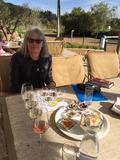
Sandra Klopper has a long career as an art historian and university administrator at several major universities in South Africa. She completed her PhD on the socio-political histories of various traditionalist art forms from present-day northern KwaZulu-Natal at the University of the Witwatersrand and she also has an MA in Art and Social Reform at the University of East Anglia in the UK.
She lectured in Art History at Wits from 1981 to 1988, joining the University of Cape Town (UCT) as a lecturer specialising in African art in 1989. In 2001 she accepted an appointment at Stellenbosch University (SU) as head of Visual Arts.
While at SU, she became Vice-Dean of Arts (Drama, Fine arts and Music), and accepted an additional appointment as acting head of the Music Department. She was the Dean of Humanities at the University of Pretoria from October 2008 to December 2011, returning to UCT in 2012, where she completed a 5-year term as Deputy Vice-Chancellor.
In addition to spearheading curriculum development initiatives at UCT, Stellenbosch University and the University of Pretoria, Sandra has played an active role in various community projects. She acted as treasurer of the Visual Arts Group (a subsidiary of the now defunct Cultural Workers Congress of the Western Cape), and from 2003 to 2005 she chaired the committee formed by the Western Cape Government to commission the Peace Laureate sculpture project at the Victoria & Alfred Waterfront in Cape Town.
Sandra Klopper has written extensively on the art of traditional communities in southern Africa; on the expressive culture of other marginalized groups, including the urban homeless; on various aspects of South African youth culture; and on the art of several contemporary South African artists.
Her most recent book project, titled Irma Stern: Are You Still Alive? Stern’s Life and Art Seen through Her Letters to Richard and Fred Feldman, 1934–1966, was published in 2017. She is currently working on a manuscript focusing on the proliferation of alternative modernisms that emerge through the interface between rural and urban communities in 20th century KwaZulu-Natal. In 2018, Sandra registered for the Wine Marketing module offered as part of Stellenbosch University’s MSc in Agricultural Economics.
This decision was motivated by the launch of her customized touring operation focusing on the Cape’s historic wine farms. On these tours, she shares her extensive knowledge of the role slavery played in the emergence of South Africa’s wine industry as well as the recent impact on local wine farms of both climate change and the development of more sustainable farming methods.